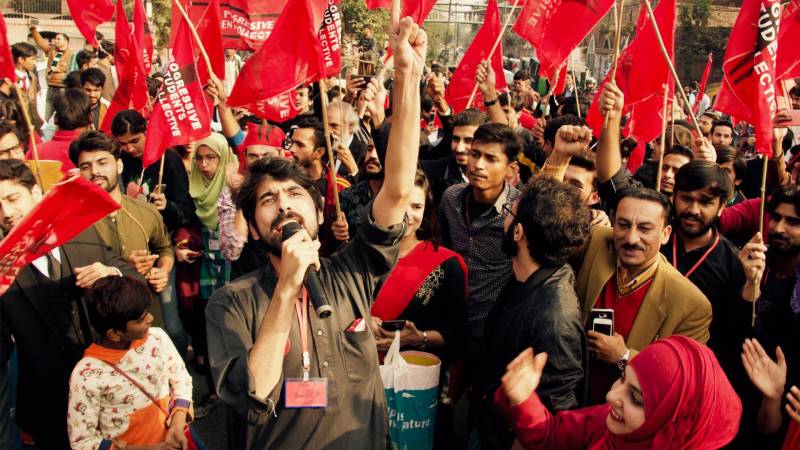
Dr. Ishtiaq Ahmed, an acclaimed political scientist, in his book, ‘Pakistan: The Garrison State’, underlines that [India's first prime minister] Jawaharlal Nehru was a leftist leader with a proclivity towards the Soviet Union. Hints of Nehru’s future alliance with the Union of Soviet Socialists Republics (USSR) were felt as India progressed towards independence. This was a problem for the capitalist allied nations, specifically the US and Britain. This was the point where the division of India was vitally needed so that an ally in South Asia is made to help contain the USSR. This ally was not Nehru’s pro-socialist India but Pakistan, with the top brass tilted towards the US and Britain. The creation of Pakistan, therefore, was partly intended to counter the expansion of the communist USSR in the South Asian region.
However, there was resistance to this idea by progressive elements in the nascent state. During the early years of its inception, there was a coup d'état against the government of PM Liaqat Ali Khan, known as the Rawalpindi Conspiracy Case of 1951. This case officially closed the chapter of a communist Pakistan. Some conspirators, after heavy sentencing, were pardoned. Major Gen. Akbar Khan, the lead conspirator, and other military officials were among the pardoned. Whereas many, including Sajjad Zaheer, the founder of the Communist Party of Pakistan, were deported to India.
The politics of the left came to fore again when a countrywide student march was held, spearheaded by left-leading students and activists. For many, the organizers belonged to the elite class that was oblivious to the daily struggles of the working class. But, for them, it was a formal declaration that it was the time that the left takes over the system for the betterment of people, especially the proletariat class.
The left has had many setbacks over the years. Its strategy of entryism to infiltrate the upper classes to amplify their messages also backfired. This boomeranged with a sharp blow when the very method was adopted by the youth charged with religious zeal, culminating in the formation of Jamaat-i-Islami – a far-right anti-left Islamic party, in addition to other such groups.
At present, the leftists are also among the academic elite. Their opinions are immediately crushed as they often come into conflict with the dominant conservative culture of Pakistan. People on the left are persecuted by the state and society alike. Recently, many progressive educators, such as Ammar Ali Jan, Pervez Hoodbhoy, and Mohammed Hanif were sacked for their ideas.
Feudalism is another hurdle in achieving communism in Pakistan. The economy of Pakistan is mostly agrarian. The agriculture is owned by feudal landlords. The idea of surrendering thousands of acres of land to the state for the public good is utopia. In the 1970s, Afzal Bangash of Mazdoor Kissan Party organized for the local peasants to resist the landlords in a district of KP. The MKP ceased to function by 1974.
“Die Religion … ist das Opium des Volkes” translated as “Religion… is the opiate of the masses” is a famous quote [taken from the works of Karl Marx] which has been misinterpreted time and again. Regardless of its real meaning, this quote could be received by the clergy with resentment and violence. It is anybody’s wild guess how religious groups of Pakistan can translate it to their advantage.
The United States loathes communism. This ideology and its followers are considered evil. The Communist Control Act of 1954 prohibits any citizen to have anything to do with communism. In addition to this, the US has fought several overseas wars against communism, such as Afghan, Vietnam and Korean wars.
Pakistan is a ‘bitter ally’ of America, but an ally nonetheless. The US has demanded Pakistan’s assistance on multiple occasions, be it on Soviet invasion in Afghanistan, 9/11, war on terror or withdrawal of troops from Afghanistan. In return, Pakistan has received a lot of financial assistance. Over the years, Pakistan has been crippled with debts, mostly from the US, causing a stronger American influence. In the future, if communists of Pakistan become a threat to the status quo, one thing for sure is that the US, like it has in the past, would give its all to prevent spreading even a trace of communism.
At the beginning of the 20th century, the once-mighty USSR showed a fantastic picture of a socialist society. But, as it got closer and closer to bankruptcy, the picture began to fade away and realism ensued. The chain broke. Even the communist nations such as China and Russia, embraced capitalism in their economic affairs.
The participation of the proletariat class is essential for any kind of social change. It is only pragmatic to engage the working-class figures in a struggle focusing mainly on them.
In Pakistan, the nexus among top state institutions and the establishment to ensure that the traditional, right-wing forms of government rule. Unless there is a paradigm shift in the doctrines of military, politics, clergy, education, and shifts in the core values, the ‘dreamers’ have no option but to keep on incubating their dream.
